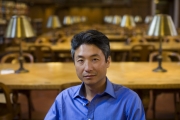
Chang-Rae Lee, 1996 PEN/Hemingway Award Winner for Native Speaker
Q: Can you tell us about your time at Yale, where you earned a B.A., and at the University of Oregon (where you earned an M.F.A.)? Who was important to your career at those institutions?
A: I had a lot of great professors at both institutions, but two stand out. At Yale, I was lucky to take Henry Louis Gates Jr.’s autobiography class in which we studied a range of classic and contemporary memoirs by writers like Rousseau and Malraux and Soyinka. Gates was dynamic, brilliant, and very passionate, and I was very excited to learn from him. What was especially great for me was that we got along particularly well and conferenced regularly. He gave me great advice about reading, writing, and life in general. I’ve kept in touch with him over the years.
I had a mentor at the University of Oregon – Garrett Hongo, a Japanese-American poet and then director of the Creative Writing Program at Oregon. Garrett was an artistic mentor as much as anything else. He taught me how to make a life in language. He was honest with me regarding the commitment it takes to be a writer. He was very tough, but very generous with his advice and time.
Q: Is it true that your PEN/Hemingway Award winning novel Native Speakerwas the first novel written by a Korean-American to be published by a mainstream publisher?
A: I don’t think so. I know there were some Korean-American novelists in the 1960s and 1970s who have that honor, but didn’t receive the recognition. Richard Kim, who wrote The Martyred, was one of those authors. I do think, however, that I was one of the first authors who came after the 1965 Immigration Act to identify as strictly Korean-American.
Q: Native Speaker’sprotagonist Henry Park is an undercover agent who loses his young son. Can you expand on the plot and setting (New York City), and how your novel discusses politics, love, culture, and identity?
A: When we came here from Korea, we settled in New York City, later moving to the suburbs, so I always knew that my first novel would be set there. I consider New York my first home. The city is so big, daunting, and so full of wonder and possibility. It’s the perfect background for a book.
Regarding plot and themes you mention: It’s hard to talk aboutNative Speakeras being focused on a certain theme or motif. The book, for me, is curious about a lot of different things. People describe it as an immigrant novel, a pseudo-spy novel … a family novel. In fact, I think it’s a novel that comprises all of these things. It doesn’t square on one set of notions, and you really can’t tease out one thread. If there’s anything that’s woven across the book it’s ultimately the idea that language is central. Everyone in the book has a relationship with language. Language is the predicate of action, it’s the definer of being, creating self and action.
Q: The Surrendered was a Pulitzer finalist in the category of Fiction in 2011. Were you surprised about that nomination?
A: I was very pleased, especially because the novel was very difficult to write, and the notoriety of the Pulitzer Prize in Fiction directed people to my work.
Q: You are the Ward W. and Priscilla B. Woods Professor of English at Stanford. Can you tell us about your Asian-American Autobiography class there?
A: I just started teaching the Asian-American Autobiography class. I’ve taught short story and creative writing classes for many years, but I decided I wanted to study Asian-American voices. I wanted to explore, with my students, authors who wrote about self, culture, and family in the context of the Asian-American experience. It’s probably the most enjoyable class I’ve taught. What’s particularly wonderful about it is that many of my students are Asian-American, and I enjoy the diversity of their voices, their varying points of view. At times, Asian-Americans are discriminated against for being focused in certain subject areas or traditions, and through this class, we learn, together, that that it is not strictly the case. We have wide and often unlikely interests and sensitivities, like everybody else.
Q: How long have you been at Stanford?
A: Three years.
Q: Do you remember where you were when you learned about winning the PEN/Hemingway Award? Do you remember how you heard the news: phone call or letter?
A: Absolutely. I was on the faculty at the University of Oregon at the time, and I was in my office there when I received a call on my office phone from a someone at The Hemingway Society informing me that I won the award. (This was before we used email.) I didn’t believe it at first … it took a few moments for the news to sink in. I was very excited, but I also felt very humbled.
Q: Do you have a favorite Ernest Hemingway book or story?
A: Yes. In Our Time was one of the first Hemingway books I encountered. I read it in eighth grade, and as a young reader I was very impressed with the simplicity of the stories. In particular, I was bowled over by the clarity and concentration of the vignettes.